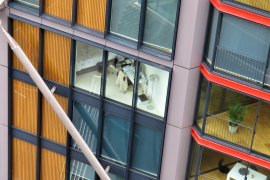THE VACCINE WORKED FOR LANEY LAST MONTH. Sores along her neck, arms, and torso ebbed. Her hospital-grade fever broke. When she was sick I sent her an arrangement of fruit. When she said she was cured, we had sex. Three days later I coughed blood and cursed her voicemail.
September heat lingers in the afternoon to blister my pox. On those days I can’t go outside. Alone I make dioramas in shoeboxes and eat coffee ice cream. The best ones I’ve done so far are Kings Park and Beckerle Pond. Kings Park looks like what it used to look like: a wooden kid-kingdom with dangerous metal slides. There are tunnels and drawbridges and splinters to be had. In my replicas there are cotton ball clouds and toothpicks and tinfoil.
I set the models up in the living room, admire them, rotate which one goes under the window. The air from outside brings them to life. Looking at Beckerle Pond, I spray sink water on my face and pretend I’m floating around on my back. But when it gets dark now the breeze is cool, no longer filled with relief from the sun. The air is foreboding, the chill a warning sign of winter. On those nights I don’t splash water or open the window for the breeze or even look at my boxes. I wrap myself in blankets and drop the shades. I watch TV programs about survival tactics in Texas. I do not think of Laney.
I wait in the lounge to see the doctor again. It’s busy so I look at kid magazines, search for matching ladybugs in apple orchards. Six appear before a bored woman in pointy glasses tells me to go in. The doctor is a tall man and overweight. His glasses fog when he walks from the sweaty hallway into my icy cell.
“How’s the Varicella?” he asks.
“Overcooked,” I cry.
Thus starts my third examination in three weeks. He pokes at contagious pockmarks on my chest with a throat culture stick. Some blisters are prominent on the skin; others inflame and chafe like pimples.
He examines the pox on my face. He tells me again that for adults, severe cases like this can be fatal. That if the swelling does not go down, I’ll need to be hospitalized. And then what? I could be infecting others every day.
The vaccine does not appear to be working. He hands me a prescription for penicillin and some pain medication and then I get changed and pay the bored woman in glasses. In the lobby a freckled boy in a white and red T-shirt circles the ladybugs in the magazine with a permanent marker.
My cell phone blinks green indicating a text from Laney. I pull out of the doctor’s office with Sports Radio wrapping an NFL preview. The message tells me to stop calling. Stop sending things to her house. I’ve come to hate the green flashing light of my cell phone. It is only ever bad news.
My last two prescriptions didn’t work, but I must keep trying. At the pharmacy, old couples wait in lines to pick up and drop off their prescriptions.
I file mine and walk through the aisles of lipstick and penny toys until my name is called. Some lonely blue hairs scan discount codes at the pay counter. I think I notice the kid from the doctor’s office with the white-and-red shirt walk in with his mother. He shuffles in before her, quickly and in the other direction. She walks through an aisle to the drop off counter as her son pulls a cheap, plastic ball from the bin.
“I saw you at the doctor’s office,” I say.
The kid bounces the ball under his legs, then off a shelf of pencil erasers.
“How many did you find?” I ask.
“What?” he asks.
“Ladybugs.”
“Oh.”
“I would have found them all if I had more time,” I tell him.
“Whatever,” he says.
“You were using a marker.”
“What?”
“In the magazine. You used a marker.”
He bounces the neon plastic ball on his knee and catches it. Then he tosses it off a row of plastic trucks and Silly Putty.
“What’s on your face?” he asks. “And on your hands?”
He continues the ball bouncing game on his head, on shelves, off his foot. He does this without looking. He stares at my pockmarks and tries to place me.
“Mosquito bites,” I say.
“Bullshit,” he says.
“There’s plenty to hate about summer, too,” I tell him.
The kid goes on like we never spoke, bouncing the ball into shelves, then leaving it for something new. He tries a hula-hoop, but can’t sustain the motion. He dumps some beach toys into his mom’s cart (the paddleballs, the sandcastle molds) but quickly she returns them to the shelves.
“We’re not going to the beach anytime soon,” she says. “The beach costs money.”
They call my name over the PA and I trade five wrinkled dollars for thirty Percocet and fifty penicillin pills.
I stumble out from under an air conditioning vent, through the automatic doors, and into the parking lot. My sores pulse in the humidity. They ooze like poison ivy and drip over the few, clean spots on my body. I open the Percocet like a jar of peanuts and crunch. I wait there in the car for the AC to cool everything down. Hopefully, the pain meds calm the burning and the penicillin kills the fever.
People in the parking lot get in and out of cars. A young girl walks into the store in front of me on her tiptoes. From behind it looks like Laney, the way she walks without swaying her arms. I shut off the car and follow the freckles on the back of her neck inside.
Three employees clean up a shelf of spilled candy bars. There are dozens of different color candies, dark chocolate Runways, and all the spooky M&Ms for Halloween. The old couples from the script lines stand together watching. In judgment, they pay for theirs and leave cheap lipstick goodbyes on the sides of each other’s faces.
The elderly couples remind me of old toys and board games. Appliances left by the curb. Some of the pieces inexorably get lost or broken over time, no matter how meticulous the care. They’re old tape players with stuck rewinds, stovetops with broken burners.
The boy from the doctor’s office sits in a chair by the script line. Seeing him again, I’m not sure he is the same ladybug boy from the doctor’s. He looks me up as I walk through an aisle of fake plants. I should have spotted Laney by now. The boy’s mother holds the neon plastic ball under one arm, touching the manager’s shoulder with the other. She sifts through her purse as if to offer money for the damaged chocolates, or for the labor. And then she looks over at me for two or three blinks of her eyelids. The manager looks my way, too. I watch the young employees pick up the candy bars. The wrappers shine beneath the sunlight coming through the window behind the register. And then the employees (two girls and a boy) also look up from their cleanup at me.
I run through the lipstick aisle first and past all the checkout counters. I slow down through the greeting card section, panic over all the aisles for Laney’s strawberry hair. Maybe she is buying me a Sorry Card or Get Well Soon Balloons. Probably she’s buying beer or index cards for school. I don’t know if I would punch her or kiss her or go on to make a scene, trampling customers and patrons, infecting them. The greeting cards play music now without me opening the flaps. An AC vent above me shoots a strong faux-breeze down the aisle. The girl I thought was Laney is a high schooler on her cell phone.
I drive to Laney’s house. On the way, a bird flies under my car from the side. I do not hear a clunk, but get out to check anyway. The bird stands still and untouched. When I approach to try and grab it, it flies away. A dead bouquet of fruit I sent feeds a herd of fruit flies by Laney’s door. Her hulking door stands at least double in size of any normal door. It’s painted pink with white trim. Her father built it, resizing the doorframe with two work buddies from O&R. A gift of safety, he always said. So that Laney wouldn’t be afraid to live alone.
I knock.
“Come out,” I yell. “I thought I saw you earlier and you have to confirm or deny this.”
Kids pass the sidewalk on metal scooters. They chirp, “She hates you, man. Give it up.” I chuck decorative pebbles from her doorstep at them in handfuls. One of them trips. He falls on a grass patch between the curb and the street. The metal scooter scrapes the sidewalk like a car wreck and makes the fall seem severe. The other boys laugh and help their friend up. They dust loose gravel and dirt from his T-shirt.
“Good shot,” the leading boy says.
They take off down a hill on their brakes, burning polyurethane wheels into squares. Laney opens the door. Her face and hands are covered with red, half-crusted pox. She hasn’t the summer tan I’ve imagined; in fact, she is off-white and spotted. I walk through the giant doorway into her place. She doesn’t say a word. She lets me walk around looking at things. I notice big posters of ski slopes and rainforests and stacks of DVDs. I handle a bottle of her prescription medication with numbers and letters like mine.
“So you are sick after all?” I say.
“What are you doing here?” she asks.
“I don’t know what to make of this,” I say and walk around misplacing things.
Bed sheets and beach towels extend over most of the windows and the floor. The walls are colored with crayon and acrylic paint. Laney scurries around from behind the island in the kitchen towards me on her tiptoes. She stands in front of me to expose how raw and frequent her sores are. Mutant beauty marks all on her neck and one above her upper lip. She presses her fingernails into my chest and kisses me frankly.
It is a mawkish kiss between two sick-shits who might not live much longer. But it wakes me to see through my own eyes again, to feel through my pores the pressure of the outside air. She kisses me once more on a scar on my left cheek. I stay sitting with her a while. We drink water from the tap in coffee mugs. I ask if she has any ice cream, and we both laugh, sitting near her unplugged Kenmore from the 80’s.
“I’m tired,” she says.
I follow her to the couch.
“Can you do that thing to my hair?” she asks.
She lies on the couch to shut her eyes. They flutter briefly then rest. I sit down by her feet and rub her ankles. I slide her pant leg up to reveal a sheath of red charred skin, scratched to the point of infection. I do what she wants me to for a moment; wisp her hair behind her ear with my little finger. She stays asleep more than two hours so I make off with her pain pills.
I drive through symmetrical neighborhoods full of kids capturing one another in pretend games. There are dozens on every block, but it seems like hundreds on every street. Perhaps I’m seeing double. I try not to speed at all or run any of them down, but it is unavoidable. I feel it coming like a premonition and then I hit something causing a screeching sound, not unlike a scream. A few kids scatter from the front end of my car and hide on someone’s lawn.
“What’d I hit?” I yell out the window.
The kids snicker behind a row of bare lilac bushes.
“Is somebody dead?” I ask, finally getting out to inspect my front end.
On my knees, the car rattles idly with a warm pressure humming. I lie flat to check the underside. A mangled metal scooter lies there, no dead kid, but the posture of the scooter is that of an injured person, with its tail bent clumsily like a broken leg.
“You think that’s funny?” I yell to the hiding kids. “I thought I fucking killed you!”
The pain pills only work in waves. Fever sets in tenfold. I’m through with the neighborhood kids and onto a private road. The idea of visiting my favorite places a last time develops. On to Kings Park. It’s dark with only the lights from stray front porches outside the lanes of my headlights. My sores pulse with every bump in the road. The parking lot is empty when I get there, save for a car or two by the tennis courts. Towards the jungle gym I start, eyeing the renovated plastic mass on chopped rubber tires. I don’t know what to hope for exactly, except to swing for a moment and reminisce.
Before I get to the incarnate playground, two shadow-outlines lurch like cripples out of the woods. They lean on each other for every step towards me.
“Can you help us?” a woman finally calls out.
The shadows form into silhouettes and then real people. An old couple, apparently both blind. The husband, an equally doting and feeble person, slouches on his wife’s shoulder.
“We’re lost,” she says. “Our eyes are no good. Can you help us out of here?”
I look back at the parking lot behind me and think I could throw a football the distance.
“You’re almost there,” I tell them. “I won’t be much help. I’m sick.”
“So are we,” the man says.
“Can we at least try?” the woman pleads.
The husband flings his arm around my shoulder before my answer. His wife does the same on my other side. Together we hump across the grassland before the parking lot. Not once do they mention my condition. I feel normal for a moment. Somewhere in the middle of the field, the old woman stops for breath.
“Are you breathing?” the husband asks.
“You’re going to have to carry me,” she says.
Feeling valiant from the pills, I scoop her up like it’s our wedding night. Once she’s in my arms, although she’s only ninety pounds, it’s hard to keep us standing.
In front of the old man, I carry his wife, mostly bones and blouse, towards the only other car in the lot. The asphalt feels like the finish line under my sneakers, but it’s slow going to the car. Finally, we reach their vehicle and I fall to my knees and lean the lady on the car tire.
“Keep going,” the woman says.
“We’re here,” I reply.
Her husband makes it to the car.
“What do we owe you for the lift, young man?”
“Come down here,” the woman says.
I hunch down in front of her to accept a kiss on the cheek.
“Goodbye. Good boy you are.”
The old man and I lift her by the waist and into the passenger’s seat. Once they’re both inside, the man reverses and peels out of the lot without his lights on. I sit for a minute, let the pills spread and dilute. Energy wanes, fever sets in again. The feeling now is not proud/courageous/dignified, more tired/disoriented. The park is slow and quiet around me. All I can see are the outlines of the tops of trees swaying against the sky and the moon. Something rustles in the wind or steps on dry twigs in the bushes. I’m thirsty as hell, I think, and then I vomit.
Through the park entrance/exit is the private road again. Most porch lights are off now. Most sounds are from the woods. I can’t drive more than a few moments without being sick out the window or into the cup holders.
When I first got the Varicella, I thought it was food poisoning. I retched on empty for a full week—so bad that I fainted in the bathroom and called an ambulance from the floor when I came to. The paramedic told me dry heaving meant your system was releasing all its CO2. Or maybe it was carbon monoxide. CO. People actually die from dry heaving, he said.
I stop the car and get out to retch proper by the entrance to Beckerle Pond. Next to the facility sign is another car, a smashed up thing with no headlights on. It’s still running. The old couple no doubt to blame, but when I get closer to inspect, there’s no sign of them. The car hums alone, pushing smoke out into the dark woods around the pond.
Into the woods I call out for the old couple. It’s quiet now, nothing more to hear than Cicada hiss. If they are close, they should hear me. I keep walking deeper into the woods surrounding the pond. Every few yards, I retch. It’s tough to stand upright at this point or walk a straight line. I use the trees to brace my steps and continue to call out for the oldies. Nothing yells back.
After some time circling in the woods, I spot the pond through the weeds. The water is still and dark like freshly blown glass. It looks like the textureless oval in my replica. To break it, I toss a rock in the middle. It plops with a single splash and disappears. I call out a last time for the old couple.
This time I cannot save them. I’m calling out for help. The pain pills are gone, and I can’t move much more than a few feet without retching. My pocks are the least of it, though still, I can feel their pulse. I imagine my skin completely covered now, but cannot verify in the dark. There’s no making it back to the car or driving anywhere else. With the last of my lifeblood, I walk towards the shoreline. As I get close, I run and then jump.
I splash hard into the pond and sink into a different darkness under the surface. The wake settles over me quickly into a thin gash and then it’s like it never happened. I think of a game I used to play as a kid, where all you have to do is hold your breath underwater and count. Release the air from the lungs to sink. Let the breaths turn into bubbles and find the surface. Count Mississippi-seconds with your eyes closed and wait for someone to fish you out.
Kevin McFadden is a writer from Nyack, New York. He received an MFA from The University of Tampa. Since then he has published several short stories and sold two screenplays. If you wish to hear his thoughts on Jim Jones, Barney, or the Safdie Brothers, he hosts a new podcast called Throat Culture.
Get this story in print!
“Medicine” originally appeared in Bridge Eight Literary Magazine, Out of Orbit
GO TO ISSUELike what you’re reading? Get new stories sent to your inbox every Monday.
Drop your email below to start >>>




